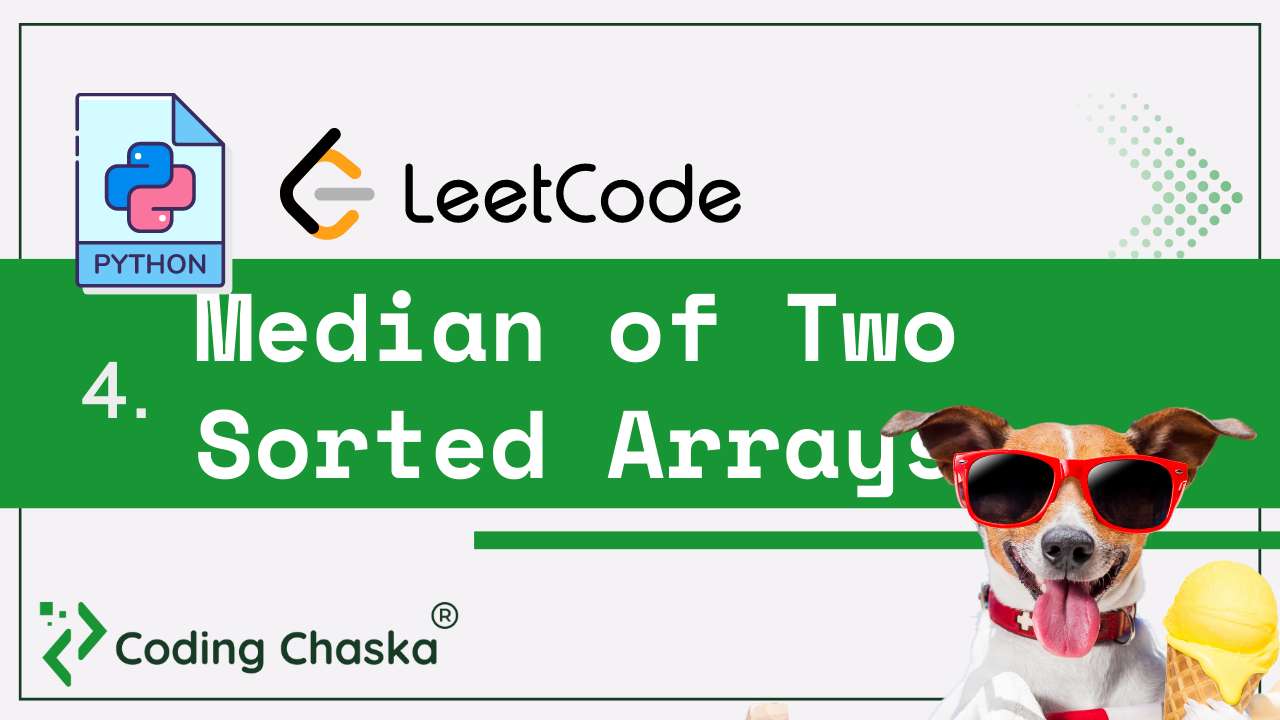
Leetcode problem 4 solution using Python - Median of Two Sorted Arrays
find the solution of leetcode problem 5 using Python
Problem
Given two sorted arrays nums1 and nums2 of size m and n respectively, return the median of the two sorted arrays.
The overall run time complexity should be O(log (m+n)).
Example 1:
Input: nums1 = [1,3], nums2 = [2]
Output: 2.00000
Explanation: merged array = [1,2,3] and median is 2.
Example 2:
Input: nums1 = [1,2], nums2 = [3,4]
Output: 2.50000
Explanation: merged array = [1,2,3,4] and median is (2 + 3) / 2 = 2.5.
Constraints:
nums1.length == m
nums2.length == n
0 <= m <= 1000
0 <= n <= 1000
1 <= m + n <= 2000
-106 <= nums1[i], nums2[i] <= 106
Solution 1
This is the simplest solution to this problem using built-in list methods i.e. extend and sort.
This is not an optimal solution for this problem.
class Solution:
def findMedianSortedArrays(self, nums1, nums2):
nums2.extend(nums1)
nums2.sort()
no_items = len(nums2)
if no_items%2!=0:
return nums2[no_items//2]
else:
return (nums2[no_items//2-1] + nums2[no_items//2])/2
Solution 2
In this solution, we are getting the combined array using 2 pointer methods. This solution is not an optimized solution for this problem.
class Solution:
def findMedianSortedArrays(self, nums1, nums2):
new_list = []
i = 0; j =0
while i<len(nums1) and j<len(nums2):
if nums1[i] < nums2[j]:
new_list.append(nums1[i])
i = i + 1
else:
new_list.append(nums2[j])
j = j + 1
new_list.extend(nums1[i:])
new_list.extend(nums2[j:])
no_items = len(new_list)
if no_items%2!=0:
return new_list[no_items//2]
else:
return (new_list[no_items//2-1] + new_list[no_items//2])/2
Solution 3
This is the best solution to this problem. This solution uses a binary search algorithm. The overall run time complexity is O(log (m+n)) for this solution. Watch this YouTube video to understand the algorithm - https://youtu.be/NTop3VTjmxk
class Solution:
def findMedianSortednums1rrays(self, nums1, nums2):
total = len(nums1) + len(nums2)
half = total // 2
if len(nums2) < len(nums1):
nums1, nums2 = nums2, nums1
l, r = 0, len(nums1) - 1 # l -> left, r-> right
while True:
i = (l + r) // 2 # nums1
j = half - i - 2 # nums2
nums1left = nums1[i] if i >= 0 else float("-infinity")
nums1right = nums1[i + 1] if (i + 1) < len(nums1) else float("infinity")
nums2left = nums2[j] if j >= 0 else float("-infinity")
nums2right = nums2[j + 1] if (j + 1) < len(nums2) else float("infinity")
# partition is correct
if nums1left <= nums2right and nums2left <= nums1right:
# odd
if total % 2:
return min(nums1right, nums2right)
# even
return (max(nums1left, nums2left) + min(nums1right, nums2right)) / 2
elif nums1left > nums2right:
r = i - 1
else:
l = i + 1
